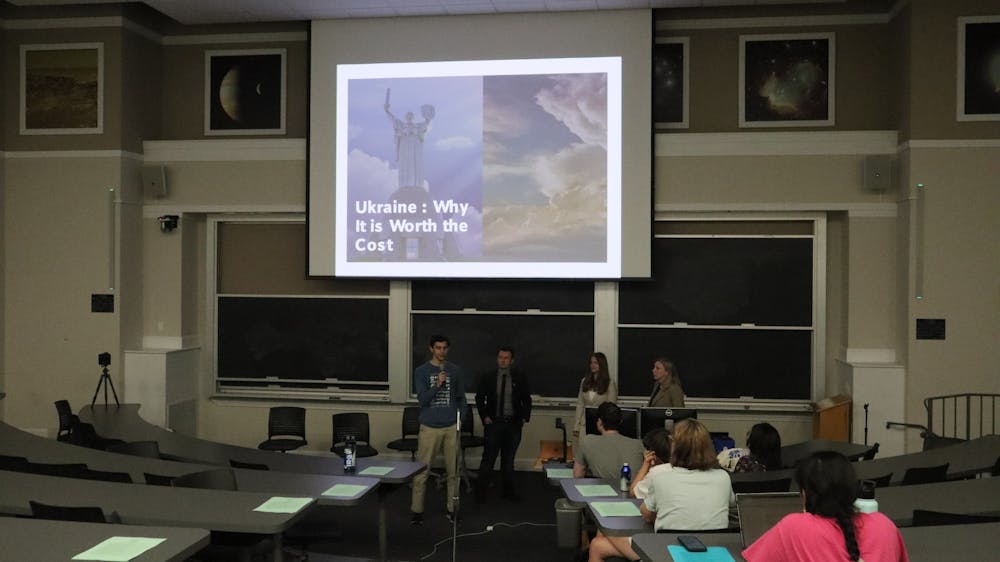The Polish Student Association and Hoos for Ukraine held a joint event Friday in Clark Hall in discussion about families affected by the ongoing conflict in Ukraine. Students shared stories of their family in Ukraine and urged community members to support the country through donations and awareness.
The conflict in Ukraine began in 2014 when Russia invaded and claimed Ukraine as its territory, and escalated when Russia invaded Ukraine for a second time Feb. 24, 2022. The presentation highlighted the cities in Ukraine most affected by the conflict — such as Mariupol and Kyiv.
During the conflict, 8,000 Ukrainian civilians have been killed and 14,000 have been injured. Several cities in Ukraine have lost power and access to water as well. Varvara Isaieva, a researcher in the Behavioral lab at the University and class of 2022 alumna, said almost all of her family and friends were in Kyiv when the invasion started..
“One of the emotions I've experienced was fear and helplessness and guilt of the survivor, that I am not with them,” Isaieva said. “And of course anger.”
Isaieva has reunited with her mother since the conflict began, but said travel from Ukraine is currently difficult so she remains unsure when she will see her again.
Similarly, Liza Tkachenko, member of Hoos for Ukraine and the Polish Student Association and first-year College student, said her family was forced to flee Kyiv after Russian bombs began to fall February 2022.
“They were literally driving through a field that was on fire and they could see the bombs overhead,” Tkachenko said. “And it was not a movie. It was their reality.”
Tkachenko said that she was unable to contact her family until the next day, several hours after the attacks had begun. Her mother and brother have since escaped to the United States while her father opted to stay behind in Ukraine.
Isaieva told a story about a bomb that had landed less than half a mile away from her grandparent’s house and the destruction of a roadway her stepfather drives along regularly.
“They [stayed] alive only by accident,” Isaieva said.
The two groups also shared a list of 14 points why United States citizens should continue to show support to send aid to Ukraine. The list was meant to be a call back to Woodrow Wilson’s 14 Points, a crucial point in the end of World War I. Some of the points included open diplomacy with no secret treaties and free trade in times of war and peace.
The PSA’s fourteen points were presented by Wilson Elder, PSA’s cultural chair and third-year College student. Elder said neither Ukraine nor its government “chose the war” and that Ukrainians have formally requested aid from western countries, allies and friends.
“The United States has undertaken to guarantee Ukrainian’s integrity and sovereignty, and we do have a duty to uphold our commitments,” Elder said.
The two student groups continue to advocate for Ukraine until change is achieved — PSA has raised $2,000 to aid Ukrainian refugees that have fled to Poland, and information to donate can be found on their website.







